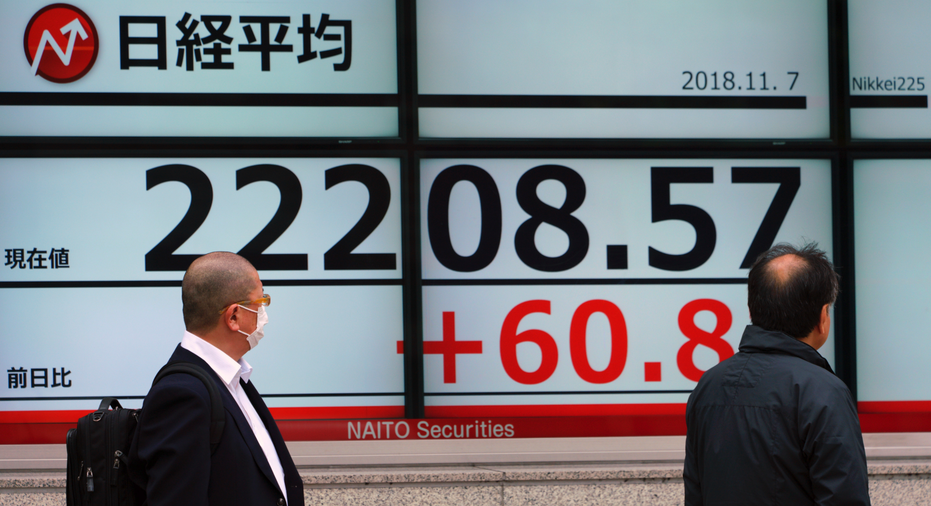Wall Street set for solid open after US midterm results
A man looks at an electronic stock board showing Japan's Nikkei 225 index at a securities firm in Tokyo Wednesday, Nov. 7, 2018. Asian shares were mostly higher Wednesday as investors awaited results from the U.S. midterm elections, which could have an impact on the global economy and trade. (AP Photo/Eugene Hoshiko)
LONDON – Wall Street is set to open higher Wednesday after the U.S. midterm elections showed the Democrats winning control of the House of Representatives and the Republicans keeping a majority in the Senate.
Though the election results increase the potential for political gridlock in Washington, traders were mostly expecting this outcome, so markets have not been as volatile as after other political events, such as the 2016 presidential vote.
"One thing is for sure - the cloud of uncertainty from the last few weeks has lifted," said Mike Read, founder of social trading platform Pelican. "Underinvested traders will return to the markets."
That appeared to be the case in Europe, where stocks enjoyed bumper gains. Britain's FTSE 100 was up 1 percent at 7,113 while Germany's DAX also spiked 1 percent to 11,598. The CAC 40 in France was 1.1 percent higher at 5,131.
Wall Street was poised for similar gains, with both the Dow and the S&P 500 futures up 0.9 percent.
The outcome of the vote could magnify President Donald Trump's legal troubles and complicate his policymaking agenda. It was unclear how the divided Congress might affect his pursuit of an "America first" trade strategy that has drawn the U.S. and China, the world's two biggest economies, into a trade war.
"A split Congress will, in all likelihood, not stop Trump from doubling down on tariffs with China," said Neil Wilson, chief markets analyst at Markets.com.
Those concerns help explain why China's main stock market, the Shanghai Composite, fell 0.7 percent to 2,641.34.
Elsewhere in Asia, Japan's benchmark Nikkei 225 fell 0.3 percent to finish at 22,085.80 while South Korea's Kospi slipped 0.5 percent to 2,078.69. But Hong Kong's Hang Seng edged 0.1 percent higher to 26,147.69 and Australia's S&P/ASX 200 rose 0.4 percent to 5,896.90.
A primary concern in Asia is the potential for trade tensions to hobble growth for export-reliant economies. Trump has imposed penalty tariffs of up to 25 percent on $250 billion of Chinese imports, and Beijing has responded with tariffs on $110 billion of American goods.
The dollar, meanwhile, gave up some recent gains, trading down 0.3 percent at 113.09 yen while the euro advanced 0.5 percent to $1.1485.
Konstantinos Anthis, head of research at financial services firm ADSS, said Trump will "definitely have a tougher time getting his legislative initiatives through Congress" but that this in "shouldn't be a dampening factor for the dollar itself in the long term."
Potentially more important for the dollar this week, he said, will be the Federal Reserve's latest interest rate announcement on Thursday and its accompanying statement. Though rates are expected to be kept on hold, policymakers are set to signal a further increase next month.
___
Yuri Kageyama in Tokyo contributed to this report.





















